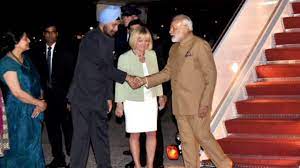Modi’s fall from grace in US
The extraordinary sequence of events and rebukes underscore burgeoning perils for Indian PM’s foreign policy
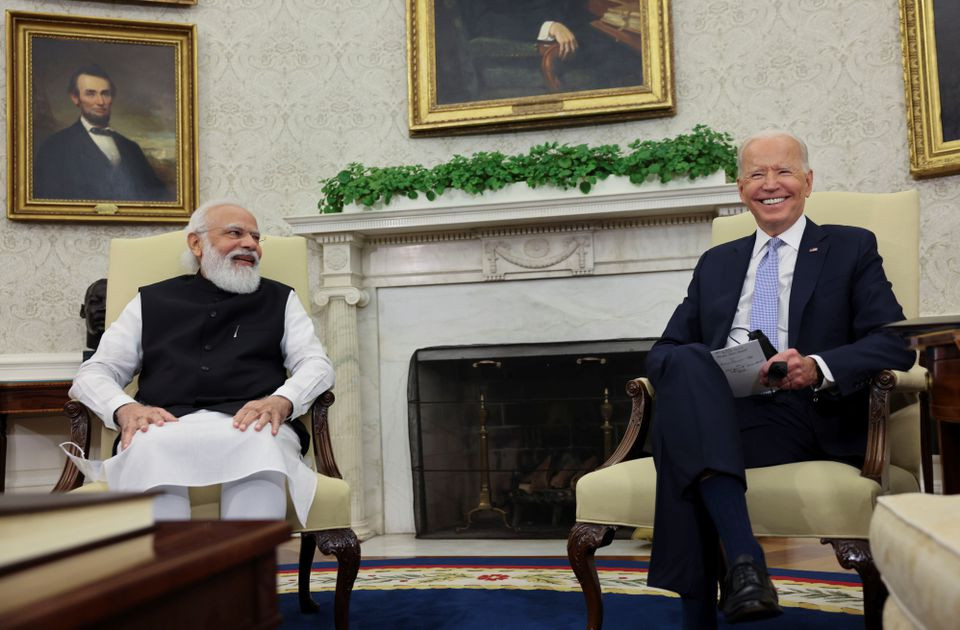
LAHORE ( Web News )
For a long time, BJP-led India’s relentless surrender to fascism and gross human rights violations record had been seamlessly papered over by flowery claims and projections of being the “biggest secular democracy” and seemed to raise no eyebrow among its Western allies.
But on Wednesday, it all seemed to lose steam as Prime Minister Narendra Modi got caught off-guard by negative press and an infuriated expat community that welcomed him in the United States, marking a subtle but meaningful shift in how the South Asian ally in the country was viewed.
Scores of Indian Americans gathered in front of the White House to protest against Modi’s visit and chanted “Save India from fascism”. Later, US Vice President Kamala Harris urged the Indian premier to protect his country’s democracy “as democracies around the world are under threat”. Earlier, when Modi landed at the airport, senior US leaders were conspicuously absent to welcome him – a departure from the good old days of “Howdy, Modi”.
The waning popularity got all the more evidenced during his poorly-attended address at the UN General Assembly when only a few attendees took the pains of clapping, rarely if ever assenting to his remarks.
The extraordinary sequence of events and rebukes, all within a three-day visit, laid bare and underscored the burgeoning perils for Modi – a Hindutva leader who is notorious for brooking to no dissent back at home with the help of a pliable media apparatus placed to do cops’ job for him.
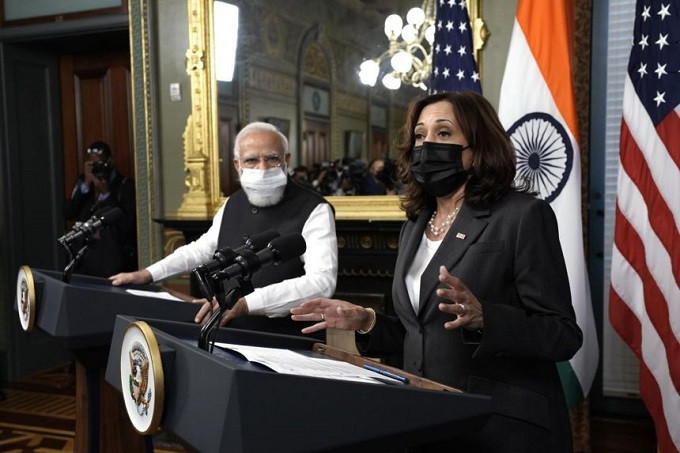
Indian Prime Minister Narendra Modi with US Vice President Kamala Harris at the five-day UNGA session.
“Time for India’s exceptionalism in the media is over,” said Naveed Ahmad, a journalist and academic based in the Arabian Gulf.
“Delhi can’t be given an absolute pass for the issue Beijing is being lambasted in the US media and intelligence,” Naveed said, observing that if Modi did not restrain Hindu neo-fundamentalist policies, the Joe Biden administration may resort to more explicit criticism “to keep some semblance of its morality”.
On Monday, as Modi returned home, Indian social media picked up steam to cover up the flop visit and churned out a fake interview of the leader to The New York Times. Images of the Indian prime minister’s huge portrait emblazoned across the front page of NYT went viral on Indian social media with loyalists waxing lyrical about the premier’s “highly successful” visit.
The headline of the purported interview read “Last, Best Hope of Earth” and the strap read “World’s most loved and most powerful leader is here to bless us”.
However, Modi’s fall from the grace seemingly in one fell swoop cannot be chalked up to merely discontent bubbling up at home as approval numbers trend downward.
Gurmehar Kaur, an independent US-based journalist of Indian origin associated with The Wire, believes that the departure from the Trump administration’s approach towards Modi is due to a changing environment in the White House.
Speaking to The Express Tribune, Kaur said that Trump and Modi were on the same page in multiple ways as both shared “bombastic and unrefined personal sensibility” and pointed out that both leaders had stormed to electoral victory in their respective countries riding on Islamophobia and whipping up “nationalist passion, and emboldened voices of intolerance and looked to malign and even throttle independent media”.
“That said, the American electorate flushed Trump out in one cycle. Modi, however, is back with a vengeance.”
Meanwhile in India, Kaur added, the liberal and secular forces haven’t just been electorally vanquished but rendered culturally irrelevant. “The change is palpable in everything from day to day familial and social relationships to the world of art and culture.”
“India’s waning democracy is no longer a well-kept secret. This certainly impacts progressive American press coverage and Modi’s speech attendance and general public perception too.”
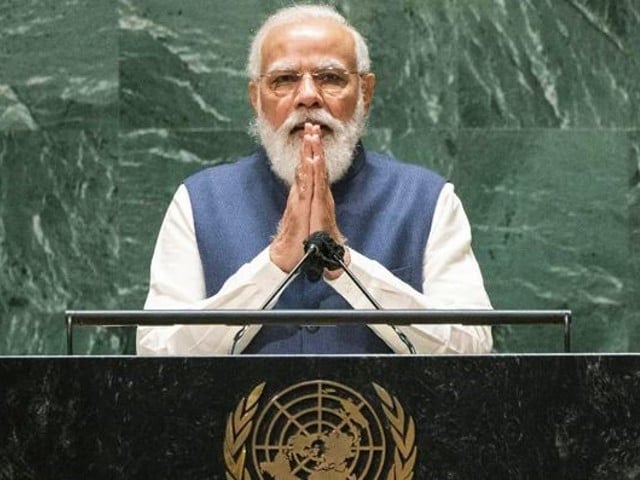
But the matter is not all that clear-cut between India and the US as realpolitik still holds sway in the affairs and moral credibility takes a back seat amid the rapidly changing geostrategic configurations. Kaur identifies a crucial difference here: “American or any leadership can be liberal in internal policy matters and hard-nosed in its external outlook.”
Modi’s India lacks moral sheen and is diminishing soft power. This may well have a long term impact, Kaur added.
‘Failed attempt to resuscitate hopes’
Yogesh Pawar, a senior Indian journalist, told The Express Tribune that a number of stunningly reckless decisions have dealt a blow to Modi government’s integrity and has stirred hand-wringing even among his ardent loyalists.
“Failing economy, mismanagement of the pandemic and his inability in showing any mettle in standing up to China’s incursion is making him lose face even with the hyper-nationalist rabid Hindutva loyalists who are seeing the India story unravelling under Modi’s leadership,” Pawar said.
Pawar observed that through the US visit Modi was aiming to breathe a new life into the diminishing enthusiasm in his own base after cracks began to appear in the official narrative about his leadership.
“He must have hoped that the US trip will help him get back some of his lost sheen. Unlike his foreign jaunts soon after being sworn in 2014 the diaspora more or less ignored him… None of the US senior leaders or officials of consequence even came to the airport.”
He said that the targeting and persecution of minorities under Modi’s rule – especially Muslims in states ruled by Hindutva supremacists – has not gone unnoticed in the international media despite his craven repeated harking back to Gandhian ideals of peace, nonviolence and tolerance.
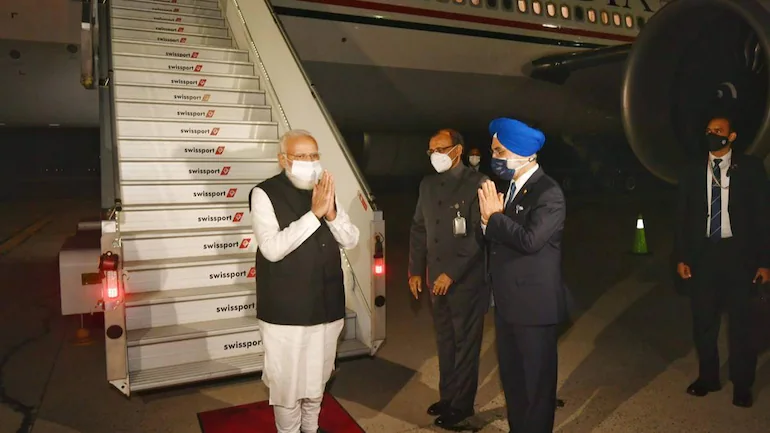
Pawar laced into the BJP for electing a terrorist with charges against her of orchestrating an attack – Pragya Thakur – to the parliament. “Pragya openly espouses and celebrates Gandhi’s assassin,” he added.
Asked whether India’s dwindling economy had anything to do with declining foreign approval and an apparent pivot by the US, Pawar said multinational companies (MNCs) have come to realise that the BJP-led premier’s interest lay only in furthering business interests of those who kept his election machine well-oiled.
“Majors like Ford have pulled out and Vodafone is still licking its wounds from the retrospective tax that the previous regime left as a legacy. The Modi government took their own sweet time to undo this, leaving Vodafone bleeding, allowing his own crony capitalist to grow his company’s footprint in the mobile telephony and internet realm,” Pawar said, casting further aspersions on the prime minister.
Courtesy….The Express Tribune

